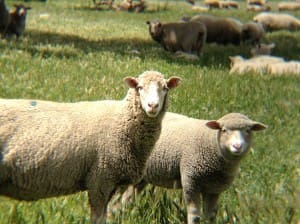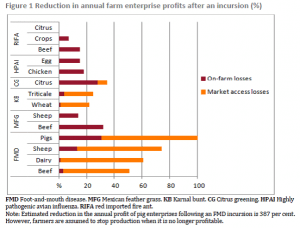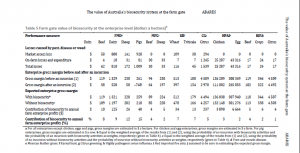 FARMGATE prices of all livestock products could be 30 percent lower if Australia was to suffer an outbreak of Foot and Mouth Disease, an ABARES report has concluded.
FARMGATE prices of all livestock products could be 30 percent lower if Australia was to suffer an outbreak of Foot and Mouth Disease, an ABARES report has concluded.
The report released today — The value of Australia’s biosecurity system at the farm gate: An analysis of avoided trade and on-farm impacts – said the price hit would be due to the loss of access to FMD-free export markets and the diversion of products to the domestic market or lower value markets where FMD is endemic.
The ABARES report said biosecurity activities to reduce the risk of an FMD outbreak make a significant contribution to the profitability of livestock enterprises.
“Annual profits of beef, dairy and sheep enterprises would be 8-12pc lower in the absence of an effective biosecurity system, and 15pc lower for pig enterprises.
“This reflects the size of the export market losses avoided (and the narrow gross margins for pig production before an incursion),” the report said.
“For pasture-based livestock industries, dairy farmers receive the highest benefits, followed by sheep and beef farmers.
“In dollar terms, the impacts range from $10 a hectare for beef farmers to $125 a hectare for dairy farmers.”
 In the event that FMD became endemic in Australia, livestock producers would be refused access to premium markets worldwide. This would force producers to sell into less lucrative FMD endemic markets. Also, meat from vaccinated animals is of lower value than meat from FMD-free regions.
In the event that FMD became endemic in Australia, livestock producers would be refused access to premium markets worldwide. This would force producers to sell into less lucrative FMD endemic markets. Also, meat from vaccinated animals is of lower value than meat from FMD-free regions.
Foot-and-mouth disease (FMD) is expected to reduce farm enterprise profits by increasing farmers’ production costs (through necessity to vaccinate livestock) and reducing domestic prices as a result of farmers losing access to premium FMD-free export markets.
In the absence of control measures, FMD reduces production volumes (because it affects the fertility and productivity of livestock) and increases mortality rates. However, farmers can avoid production losses entirely by vaccinating animals, giving them full protection against FMD for six months.
The report analysis assumed farmers would choose a vaccination strategy after weighing the cost against the expected benefits — avoided production losses. Different vaccination strategies are assumed: twice a year for calves, heifers and steers; once a year for cows in beef and dairy systems; and once a year for all animals in sheep and pig systems. The cost of the vaccine is assumed to be $4.12 a dose.
Biosecurity valued at $17,500 for average farmer
ABARES said the report demonstrated the real value of Australia’s world-class biosecurity system at up to $17,500 a year for the average farmer.
ABARES executive director Karen Schneider said that managing biosecurity was critical to maintaining the productivity of Australia’s agricultural sector by supporting business as usual operating conditions for farmers.
“Freedom from many of the world’s major pests and diseases provides agricultural industries with a significant trade advantage and is important for maintaining access to valuable export markets,” Ms Schneider said.
“This study estimates the value of Australia’s biosecurity system ‘at the farmgate’, using a case study approach.”
Broadacre farms at risk of range of biosecurity threats
 The report considers the effect on farm enterprise profits of an outbreak of six potentially significant biosecurity threats to Australian agriculture, including foot-and-mouth disease (FMD), Mexican feather grass, citrus greening, highly pathogenic avian influenza and Karnal bunt.
The report considers the effect on farm enterprise profits of an outbreak of six potentially significant biosecurity threats to Australian agriculture, including foot-and-mouth disease (FMD), Mexican feather grass, citrus greening, highly pathogenic avian influenza and Karnal bunt.
Ms Schneider said that broadacre farms typically undertake a range of cropping and livestock activities, and farm profits may be affected by several pests and diseases.
“Without our current biosecurity system in place, the profits of broadacre farms would be $12,000 to $17,500 less because of the higher risk of FMD, Mexican feather grass and Karnal bunt outbreaks,” she said.
“What’s more, the Australian biosecurity system directly supports higher land values because the profits generated by broadacre farms are higher than they would have been without the system in place.”
Ms Schneider said these figures were likely to be conservative as they were based only on top-level threats and diseases affecting farming.
The full report is available at agriculture.gov.au/abares/publications.\
Source: ABARES

HAVE YOUR SAY